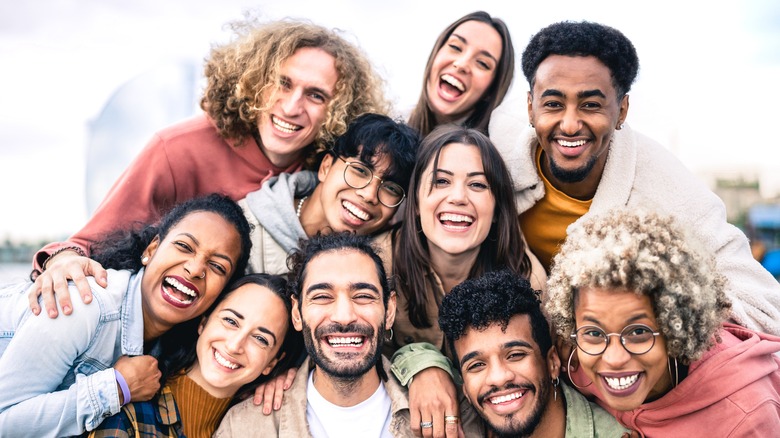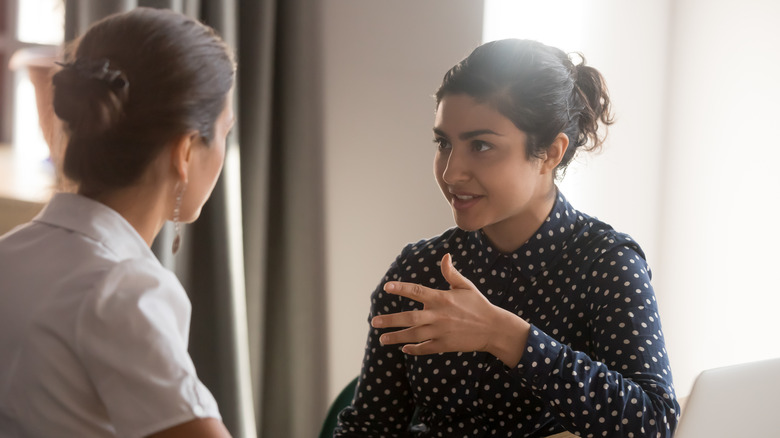Why You Should Vet Your Friends The Same Way You Would A Potential Romantic Partner
Friends are here for us through ups and downs, hiring and firings, situationships and relationships — maybe yours have even stuck by your side through your "edgy" phase in high school or your worst fashion decisions. Still, platonic love often takes a backseat to romance when it comes to Hollywood movies, bestsellers, and Billboard hits. "We've always had this hierarchy of love with romantic love at the top and friendship seen as second class," University of Maryland professor and psychologist Marisa G. Franco explained to The Washington Post. "We are constantly fed the message that the romantic relationship is the only one that matters."
Regardless of what your favorite movies might tell you, stable friendships are of equal — if not greater — importance to romantic love. Not only do friendships help us feel more connected to the surrounding world, but they can also have marked benefits on your long-term health and even increase your lifespan, per Mayo Clinic. With this in mind, take great care in forming new friendships. What activities can you see yourself doing together? Do you find your conversations fulfilling? And, perhaps most importantly, do you feel energized when your interactions are over?
In other words, you should vet your potential friends in the same way you would romantic partners. Leading a healthy life means surrounding yourself with people you respect — and who respect you.
Look for someone who allows you to be yourself
Just as an ideal romantic partner will allow you to be fully yourself — whether that means embracing your interests or appreciating your sense of humor — so should a friend. Like romantic love, platonic love relies on honesty, dependability, and empathy. Friendships that aren't built on these core tenets can drag you down over time. "We all have an individual and unique social battery that is drained or restored by certain interactions and situations," London-based psychologist and author Dr. Meg Arroll informed Stylist. "The reasons why some people drain our batteries more than others is to do with a combination of factors, including your personality, the other person's personality, your attachment style and how stressed you're feeling."
Before continuing a friendship, consider that person's effect on your social battery — due to no fault of anyone involved, some personalities clash. Ask yourself, "What do we add to each other's lives?"
If you notice that a friend pushes boundaries by regularly demanding emotional support and providing little in return, it may be time to part ways. If they express jealousy or criticize your achievements rather than celebrate them, this may be a sign your friendship is over. Ultimately, interpersonal connections should add a net positive to your life. If they don't, learn how to let go.
How to end a friendship without the drama
Though breaking up with a partner is never easy, most people have experienced this at one time or another. The rule book for friendship splits is less clear. First and foremost, breakup conversations are best held in person, as meaning can often get misconstrued over text. "To avoid unwanted drama," psychotherapist Joshua Peters advised CBC, "it's always best to tell your friend first and to avoid involving others whenever possible."
If your friend hears the bad news on the grapevine, it will only serve to embarrass them and complicate the situation further. Furthermore, rather than trying your hand at the frustrating "slow fade" phenomenon, give your friend the courtesy of clarity. Yes, honesty may be hard at first, but both of you will be grateful in the long run.
If you're on the hunt for new friendships, consider applying the same methods you would use to find a romantic partner. Apps like Bumble BFF and MeetUp are designed for connecting with new friends in the same way traditional Bumble, Tinder, or Hinge are made for romance. Be bold, show some initiative, and — if you're struggling to get along — don't be afraid to move on.


